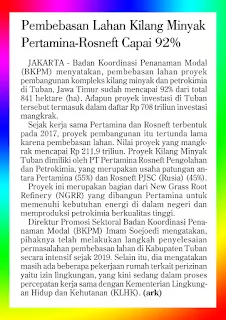PT Pertamina (Persero) is looking for new partners to develop the Cilacap Refinery upgrading and capacity building project. This is after the project economics agreement was not reached with Saudi Aramco, which has had cooperation with Pertamina since 2016.
Fajriyah Usman
"The assessment of [new strategic partners] is underway. However, we cannot convey [the candidates], "said Fajriyah Usman.
Fajriyah Usman explained, Pertamina and Saudi Aramco did not agree on the economic price of the Cilacap Refinery Project. Pertamina offers a rental scheme for the project, the same as the scheme used by the company in Balikpapan Refinery. Under this scheme, Pertamina will pay the rental fees for the joint venture with Saudi Aramco which is building a new refinery unit at the Cilacap Refinery Complex.
"Not agreeing about economic prices which may make calculations not right at this time, when oil and gas conditions are down," Fajriyah explained.
Previously, with the initial scheme, Pertamina and Saudi Aramco also did not immediately reach an agreement related to the valuation of the Cilacap Refinery which caused the project to be delayed.
Pertamina President Director Nicke Widyawati briefly explained, the difference between the valuations calculated by Pertamina and Saudi Aramco is still very large. The Saudi Aramco count is very low, while Pertamina has a book value as a minimum limit to spin off assets.
Pertamina appointed Saudi Aramco as a partner in 2014. After two years, both of them signed a joint venture development agreement (JVDA) agreement in December 2016. This agreement became the basis for both of them forming a joint venture that will work on the Cilacap Refinery Project.
This JVDA should end in December 2018 but then be extended by six months until June 2019. Then the JVDA will be extended to September, then extended for the third time until October, and lastly extended until December 2019. This agreement is then extended until the first quarter of 2020 but again extended until the end of April.
The Cilacap refinery is targeted to start operating in 2025. After upgrading, the crude oil processing capacity of the Cilacap Refinery will increase from 348 thousand barrels per day (BPD) to 370 thousand BPD. Furthermore, there will be additional production of gasoline (gasoline) 80 thousand BPD, diesel 60 thousand BPD, and aviation fuel of 40 thousand BPD. Fuel production increased significantly because the ability of refineries to process crude oil into finished products (NCI) rose from 74% to 92-98%.
On Target
Meanwhile, Pertamina said that the construction of the Balikpapan Refinery Project has now reached 16.32%, ahead of the last quarter of this year which recorded 15.02%. The details, until May 17, engineering activities have reached 6.05%, procurement 5.85%, construction 4.38%, and commissioning 0.03%.
"The development of this project is still in accordance with the plan, although in the process it must implement strict health protocols," said Fajriyah.
The Balikpapan Refinery Project will increase refinery processing capacity from 260 thousand BPD to 360 thousand BPD and improve the quality of fuel products from Euro II equivalent to Euro V. The Balikpapan Refinery Project is also synergized with the construction of the New Crude Lawe-Lawe Tankage Facility with a storage capacity of 2 million barrel.
Fajriyah asserted Pertamina remained committed to completing all national strategic projects including the Cilacap and Balikpapan Refinery Projects. Pertamina will maximize and optimize the completion of the refinery development master plan (RDMP) and construction of a new refinery (grass root refinery / GRR) so that it can be completed according to the specified time target.
"The RDMP and GRR megaprojects are national strategic projects that have been set to continue during the co-19 pandemic and fluctuations in crude oil prices and the rupiah exchange rate against the dollar. This project is important to ensure that national energy security and independence can be realized immediately, "said Fajriyah.
The entire refinery project is targeted to be completed in 2026. He added, if the project is completed, the refinery's total capacity, which at the moment of 1 million barrels per day (BPD), will increase to 2 million BPD so that fuel needs can be met without the need for imports.
"Hopefully, in 2026, we will be independent by no longer importing BBM," said Fajriyah Usman.
Investor Daily, Page-9, Saturday, May 30, 2020









































